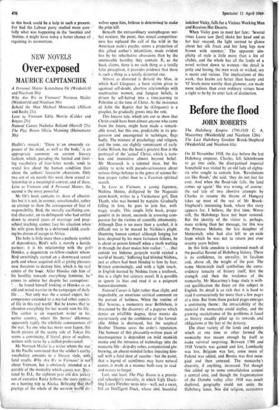Before the flood
JOHN ROBERTS
The. Habsburg Empire 1790-1918 C. A. Macartney (Weidenfeld and Nicolson 126s) The Last Habsburg Gordon Brook-Shepherd (Weidenfeld and Nicolson 63s) On 10 November 1918, the day before the last Habsburg emperor, Charles, left Schembrunn to go into exile, the disorganised imperial household was visited by an old lady of eighty- six who sought to console him. 'Revolutions are like floods,' she said, 'they do not last for ever. And when -the flood-tide falls, the land comes up again.' She was wrong, of course: the sad tale of two abortive attempts by Charles to resume the throne of Hungary takes up most of the rest of Mr Brook- Shepherd's interesting book, where this story appears for, I believe, the first time. Worse still, the Habsburgs have not been restored. But the identity of the visitor is, perhaps, more striking than her message, for this was the. Princess Melanie, the last daughter of Metternich, who had also left to an exile from which he was not to return just over seventy years before.
In this little anecdote is condensed much of the peculiar flavour of Habsburg history. There is its confidence, its unreality, its fatalism and, above all, the weight of the past. The name Metternich itself symbolises the extra- ordinary tenacity of history itself, first the strength and then the weakness of the monarchy. Mr Macartney's huge study is with- out qualification the finest on this subject in English. Its detail is so rich that it is hard to read it consecutively for more than a few pages at a time. But from those packed pages emerges a continuing theme: the intractability of the material the monarchy -could deploy, and the growing recalcitrance of the problems it faced as' history steadily piled up its rewards and obligations at the feet of the dynasty.
The sheer variety of the lands and peoples which at one time or other formed the monarchy was reason enough by itself to make survival surprising. Between 1780 and 1918 Venetia was gained and lost, Lombardy was lost, Belgium was lost, some more of Poland was added, and Bosnia was- first occu- pied and then annexed. The monarchy's diversity, if anything, increased. Yet though this added up to some consolidation around a central cote, and though the fragmentation of the Danube valley after 1918 was much deplored, geography could not unite the Habsburg lands. Nor did religion, economics
orinstitutions; they only brought other diversities carefully disentangled by Mr
Macartney. The only overall unity was that of history: for one reason or another, all had come under the dynasty. - As the historical context changed, history ceased to be a bulwark to the dynasty and became a burden. It is an outstanding merit among many in Mr Macartney's book that it clearly delineates in a complicated story the increasing narrowness of the choices available to the rulers and the growing restrictions on their freedom to act as their historic responsi- bilities hardehed into a strait-jacket. It was not just the racial question, but also the shape of the institutions bequeathed to the monarchy to deal with it that were crippling. It was not just Francis Joseph's lack of imagination or Charles's lack of .toughness that made arm- chair constitution-making a pointless activity; history had once favoured the dynasty by offering it opportunities and by the nine- teenth century it was ceasing to do so. It was not even just the Magyars. As might be expected from a scholar who has made such.
contributions to Hungarian history, the Magyar case is revealed to be richer and better than Englishmen formed in the Seton-Watson and Wickham Steed tradition might expect, but the Magyars were trapped by history too. Their last triumph, the pantomime of Charles's oath-as King in December 1916, was swiftly to be followed by the dissolution of the lands of the crown of St Stephen.
Princess Metternich could hardly be expec- ted to sense this. Her father, after all, was only the servant of the dynasty: it had sur- vived 1848 even if he had not (Mr Macartney has two excellent pages on his last-minute writhings before bowing himself out). But the blind force of history in the end seems the only key. A search for 'crucial factore seems meaningless after reading these dense pages. The gears have become locked; at last, no single piece of the machine can be got to work in the face of the immobility of the rest. Even the army gives way. There was no overthrow,. simply disintegration.
The mapping of what lay behind the final collapse is Mr Macartney's achievement and it is masterly, given the immense complexity of organising this story. He does not spend much ink on the final convulsions: 1848 gets to itself a chapter of over a hundred pages but the two years of Charles's reign only a dozen and this seems apprOpriate. The book's only flaw is an inadequate index (it is odd, for example, to find no entry for Holy Roman Empire in an account which begins, in spite of the title, in 1780); the only regret it may leave in the reader Is that it gives so little space to the history of ideas.
The focus of Mr Brook-Shepherd's enjoy- able book is the last throes of the empire and
the subsequent fiascos. For Charles and the Empress Zita the word tragedy seems appro- priate; the good intentions shown in the Sixtus negotiations of Charles's constitutional dreams were not enough in a situation so irredeem- ably deteriorated. The authOr has had the advantage of unpublished family papers and of the personal commentary and reminiscence of the Empress and, naturally, his story tends- to explain much in terms of avoidable error and villainy. The result is moving, well-told and well worth reading, but in the end the reader who has first been at Mr Macartney will feel that the historical moment of the Habsburgs was long since past.



































 Previous page
Previous page